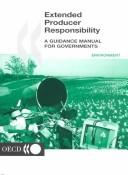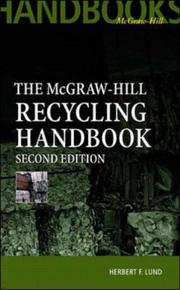| Listing 1 - 2 of 2 |
Sort by
|

ISBN: 926418600X 9786610029860 1280029862 9264189866 Year: 2001 Publisher: Paris : OECD Publishing,
Abstract | Keywords | Export | Availability | Bookmark
 Loading...
Loading...Choose an application
- Reference Manager
- EndNote
- RefWorks (Direct export to RefWorks)
Municipal waste has increased 22 % per capita from 1980 to 1997. At the same time, the difficulty of siting new waste disposal facilities has increased. While major progress has been made to lessen the per capita generation of air and water pollution over the past decades, waste generation is still on the rise. Faced with the increase of waste, many governments have reviewed available policy options and concluded that placing the responsibility for the post-consumer phase of certain goods on producers could provide a means to relieve certain environmental pressures, arising from post-consumer waste. Extended Producer Responsibility (EPR) is a policy approach under which producers accept significant responsibility - financial and/or physical - for the treatment or disposal of post-consumer products. Assigning such responsibility could provide incentives to prevent wastes at the source, promote product design for the environment and support the achievement of public recycling and materials management goals. Within the OECD the trend is towards the extension of EPR to new products, product groups and waste streams such as electrical appliances and electronics. This guidance manual represents one means to inform national governments about the potential benefits and costs associated with EPR.
#SBIB:35H434 --- #A0202A --- 552 Afvalstoffen --- Beleidssectoren: milieubeleid en ruimtelijke ordening --- Environment. --- Industries --- Social responsibility of business --- Environmental aspects --- Business --- Corporate accountability --- Corporate responsibility --- Corporate social responsibility --- Corporations --- CSR (Corporate social responsibility) --- Social responsibility, Corporate --- Social responsibility of industry --- Business ethics --- Issues management --- Industrial production --- Industry --- Economics --- Social responsibility --- Social aspects --- Environment --- Industries, Primitive

ISBN: 0070391564 Year: 2001 Publisher: New York : McGraw-Hill,
Abstract | Keywords | Export | Availability | Bookmark
 Loading...
Loading...Choose an application
- Reference Manager
- EndNote
- RefWorks (Direct export to RefWorks)
recyclage --- afvalscheiding --- afvalsortering --- recycleerbaarheid --- recyclageproces --- recyclage installatie --- management --- 628.477.6 --- 504.064.4 --- Recycling (Waste, etc.) --- -Conversion of waste products --- Recovery of natural resources --- Recovery of waste materials --- Resource recovery --- Waste recycling --- Waste reuse --- Conservation of natural resources --- Refuse and refuse disposal --- Energy conservation --- Salvage (Waste, etc.) --- Waste products --- Recovery, recycling and re-use of waste and scrap. Salvage of scrap --- Measures in conservation engineering. Including: wasteless and low-waste technology --- Afvalstoffen --- Hergebruik --- Verenigde Staten --- Vuilverwerking --- -Recovery, recycling and re-use of waste and scrap. Salvage of scrap --- Afvalstoffen. --- Hergebruik. --- Verenigde Staten. --- Vuilverwerking. --- 504.064.4 Measures in conservation engineering. Including: wasteless and low-waste technology --- 628.477.6 Recovery, recycling and re-use of waste and scrap. Salvage of scrap --- Conversion of waste products --- Recyclage (déchets, etc.) --- Recycling (waste, etc.) --- Environmental management --- Gestion de l'environnement --- United states
| Listing 1 - 2 of 2 |
Sort by
|

 Search
Search Feedback
Feedback About UniCat
About UniCat  Help
Help News
News